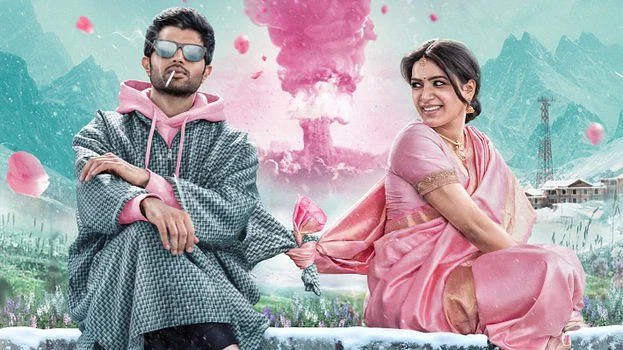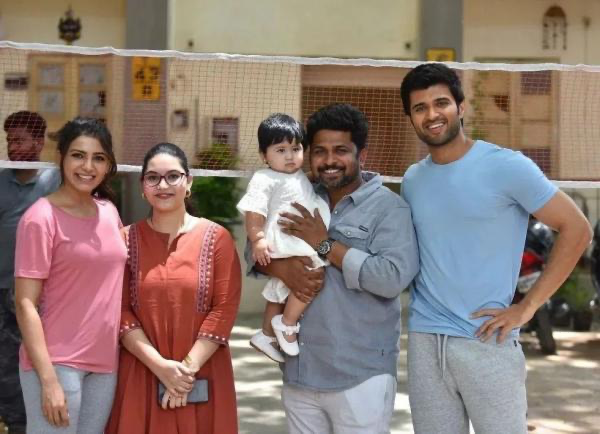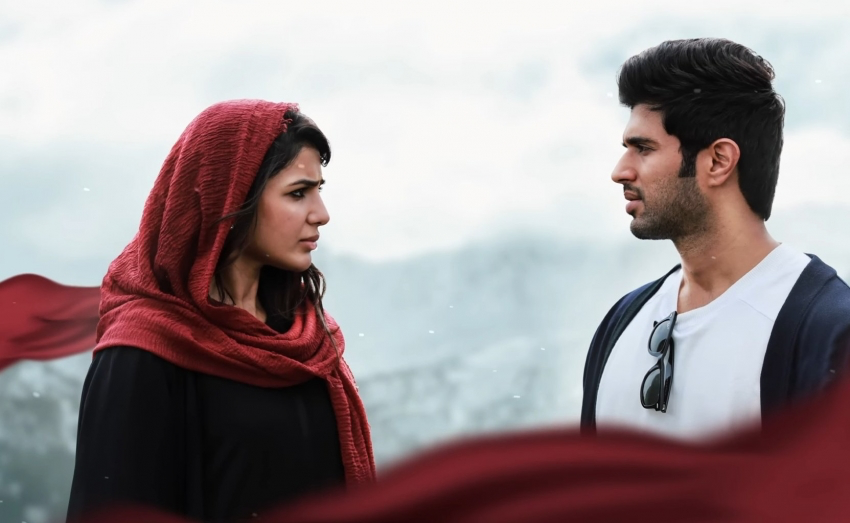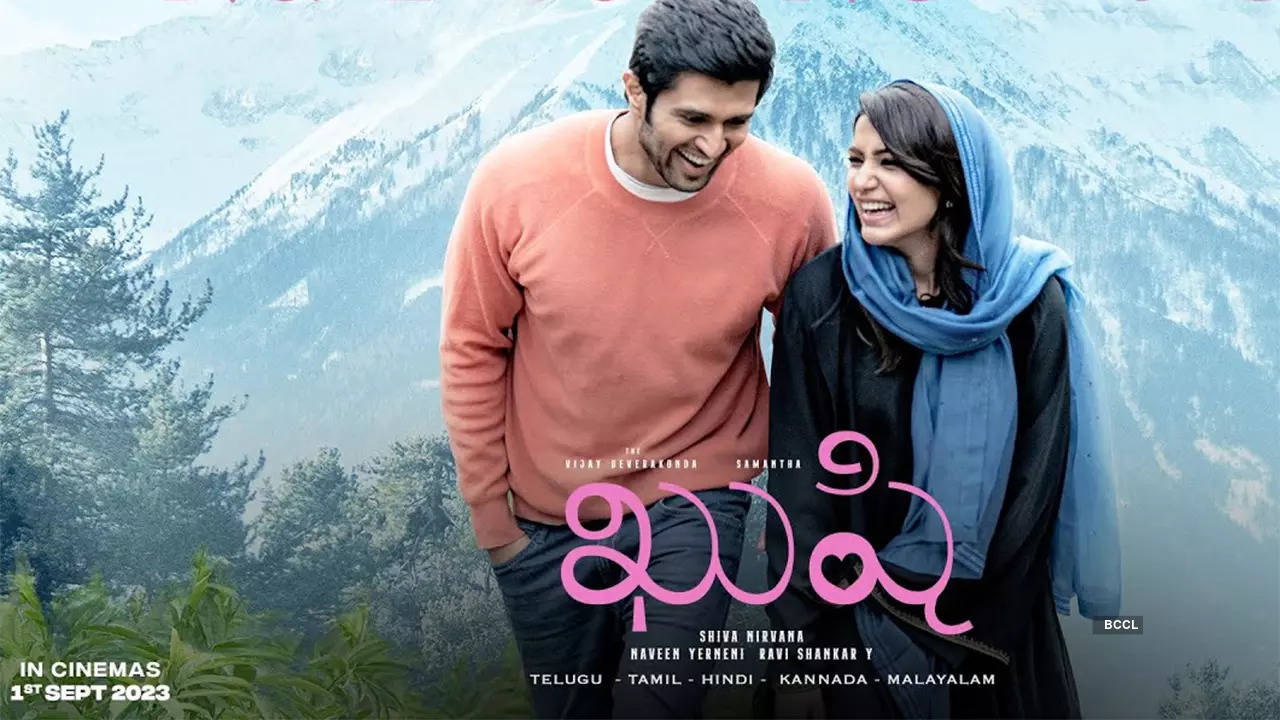2.5/5
First things first, no doubt Kushi is a better film for Vijay Devarakonda, Samantha, and Shiva Nirvana. From the horrible Liger, pale Shaakuntalam, and the unspeakable rod I’d rather not speak about as a Nani fan, Kushi packs in at least a cohesive narrative and fills the screen with some genuinely good laughable moments, some good emotional arcs, and some suitable character constructs. Nirvana plays it safe with his comfort space of marriage as he attempts to explore the intricacies of life after initial love in the form of Kushi.
Yet, in the final film of his “marriage is not a bed of roses” trilogy, Kushi is undoubtedly his weakest. Because the moment the movie enters the plot, it goes off the rails. It’s very convenient to pack in the views of Kashmir, make jokes about its warlike state, picture two love songs that come in with very little segue and set up a plot conveniently opposing other sides. Nirvana does this, and to his credit, the comedy is good, but he starts to run out of ideas when the movie actually holds itself to some serious issues.
Throughout, a sense of laziness permeates through, but there’s also a clear focus on making it breezy and entertaining to families and average movie-goers. A shortcut, but a shortcut that works as Kushi never weights down. For the majority of its runtime, it remains simple, sweet, and seemingly decent enough to take it to the finish line. Kushi is the fit of a time-pass movie but veers plenty towards the weaker side.

PLOT:
Viplav (Vijay Devarakonda), a BSNL employee, goes to Kashmir and falls in love with Ara Begum (Samantha), who is Aaradhya from Kakinada in disguise to avoid conflicts in Kashmir. When they inevitably fall in love, problems with their families arise when Viplav’s father, atheist Lenin Satyam (Sachin Khedhakar), and Chadarangam Srinivasa Rao (Murali Sharma) don’t see eye to eye. The journey it takes forms the rest of the story.

WRITING:
Shiva Nirvana’s obsession with marriage is quite a strange one. He seems hell-bent on exploring every dimension that a healthy marriage can screw up in, only to redeem it and reveal the true beauty of marriage. Ninnu Kori studied the presence of a third person through an ex-lover, Majili looks at the lack of love, and now Kushi looks at familial and religious conflicts. But with each movie, that subtlety and nuance to bring out the competition and show it maturely keeps going down and down. After watching the entirety of Kushi, it adds down to the slide. Nirvana’s writing hinges on the edge of convenience before entirely going into haphazardness, with all the events clicking before all the possibilities are just spurned out from each other.
The plot itself is quite a routine one. All of Nirvana’s previous ones are, too, but this one falls into a template that we see at least 2-3 times a year. Ante Sundaraniki, Krishna Vrinda Vihari, now Kushi. Surprisingly, Kushi also deals with fertility problems at a point. Besides this, how Nirvana plans the plot is just too routine to overlook after a moment. Emotional arcs are uncomfortably fitted in to bring out the final closure; the romance has the same tropes of “see the hero do good, fall in love .”Nirvana’s writing reminds us of old Telugu movies for a wrong reason: introduce characters, cut to a song, fill up with some random comedy sequences, and then boom-we have a love story.
There isn’t much nuance that Nirvana’s writing approaches the screenplay with. Everything is cookie-cutter in the way it comes the events. Viplav and Aradhya’s romantic track is a clear indication of this. We rarely see Aradhya share a soulful moment with Viplav to indicate his romance. Nor do we see her express anything but annoyance for 80% of the track. She suddenly turns a leaf when Viplav becomes benevolent, and boom. No matter how good Hesham’s songs are (with both being utter speedbreakers after a point), what to be of the writing?
However, for the most part, the comedy saves the first half of the writing. The jokes mostly land, and the comedy blocks are set up well- the entire track with the apples had me in splits. Nirvana’s funniest first half as he brings out some of the comedy to help the story stay afloat, generating a breezy feel towards the proceedings. As an audience, we think it’s the same thing, but it never feels bogged down because Nirvana knows when to cut his scene and write the next without introducing too many factors. He keeps his characters close, and he keeps his events straightforward.
The conflict is written well for the most part. I wish we saw more of this. Every time Sachin Khedakhar and Murali Sharma converse and argue about their beliefs, the movie gains some distinct voice. Excluding a very odd debate with Jaffer, delving into their mindsets and where their thoughts draw a line infuses interest into the story without the same template. A done-to-death message is incorporated well; as the movie says, I don’t think there’s any problem with reinforcing that humanity, not beliefs, reign supreme.
Unfortunately, that tends to be the only bright spot in the second half of the writing. Nirvana either becomes erratic with his writing, spewing out tracks that completely sideline the story (the entire fertility track was crass) or dragging out the conflict without establishing a grounded sense of drama. We never get to see what Viplav and Aradhya fight about, nor any of their fights concretely. Movies like Love Today do this well- outlining the conflict and leading us through the fights so we connect with the resolution. Here, the film harps on about fighting, Samantha and VD don’t talk, sit apart, then something happens, sad song- hold up for a minute! Where is the part where they actually argue? Have irreconcilable differences? The characters Vip, Lav, and Aradhya have shades of being written well, but both end up crashing in a mess.
The entire bar sequence is a testament to this. Viplav and Aradhya fight ONCE and don’t talk for two days. Then he gets a fertility test, and suddenly, the whole bar starts talking about it. Cue Osi Pellamma song. Then there are some god-awful dialogues about the Titanic I’m not going to type again, and then that’s the “conflict.” No buildup and no sense of dramatic storytelling. Furthering the problem, it cuts to a ONE-YEAR LATER card after the song Aaradhya. Taking VD’s movie, Geetha Govindam, the events all maintained themselves without jumping timelines. Shame that Kushi’s writing couldn’t do that.
The writing, quite frankly, gets abysmal very quickly and reduces the characters to mere puppets in an ending we know will happen. Rohini’s track should have been dealt with better, too. Eventually, Nirvana runs out of ideas before the climax, which seems to be the only idea he thinks of because it is routine but well fleshed out. We get a contrast of both sides and an exploration of the characters. The writing is well done and ends on a good note despite some ironically funny characters. Nirvana routinely sets the movie through his writing, which is the biggest culprit.

DIRECTION:
Nirvana’s direction is better, but only to the point where he keeps the movie light so that, from a directional standpoint, it never weighs down as heavy and mundane. From the first frame, we get to see his writing’s convenience and how he doesn’t waste time to set up his storytelling and narrative. Lenin Satyam is introduced amidst a crowd, bringing up the crux before he quickly contrasts VD’s household and their mindsets. This refusal to get hung up on one event and start introducing proceedings quickly keeps time passing despite the glitches in writing. Nirvana’s directions involve us from the outpost very capably.
Kashmir is also showcased pretty well. The first thing he nails is the comedy, which is executed satisfactorily, leading to some hilarious moments with his staging. As said earlier, the apple scene is probably the best moment in the entire movie; written well but staged even better as Viplav quickly realizes the challenge he is in for. Comedy like that and VD’s butler Hindi (which is done well) is set up nicely. The second thing is the entire latent Mani Ratnam angle that Nirvana’s dialogues keep referencing, and the song Naa Roja Nuvve made explicitly clear. Directionally, Nirvana contrasts visuals of beautiful Kashmir with war-stricken Kashmir, outlines Viplav’s struggles, and then again brings up Samantha to outline that she is HIS Mani Ratnam romance. It’s why the songs and the attempt to reference Mani Ratnam don’t come across as cringe.
Nirvana’s direction localizes the area of Kashmir quite well to us, allowing us to focus on the characters’ journey. Apart from a few touches to the law, he keeps it grounded and stages it decently to the point where the comedy works, and the conflict, despite being shrouded in mundanity, doesn’t feel like that because of his placements. Pelli-choopulu in a metro, the contrast between the families, it seems like Nirvana hits his stride for most of the first half to allow the movie events to ebb naturally. The interval bang is set well, too.
The action scenes were the one part where the direction needed to be improved. The bike scene in the first half and the metro scene in the second half are culprits. Poor narrative choices with terrible green screen and unimpressive progressions in the former, and just mundanity that we have seen 1000 times as recently as Vakeel Saab in the latter. It shows that Nirvana has always been weak in this department.
When the second half finished, it felt like Nirvana exchanged his breeziness for his voice; he does bring out his opinions, but they are marred by poor writing choices and direction that attempt to distinguish but not salvage the movie. The entire movie after Aaradhya, a song that works well in the movie, runs on hyperspeed mode with events that aren’t well executed and conflicts that don’t seem like conflicts that the movie makes out to be bigger than they are. The first time Viplav and Aradhya argue, there’s a level of casual talk to the entire scene that the heavy-duty dialogues can’t even salvage. Nirvana fails to escalate the tension and make it palpable, so the audience doesn’t quite connect to what happens and why the tension is worrisome. The less said about the fertility and bar scenes, the better. With bad writing and lousy staging, it felt like the movie was quickly dropping into non-redeemable territory.
Nirvana finds his voice for about 2 minutes in the climax, where a rained-out homam and Murali Sharma remarking that humanity is the way to go provide a neat contrast and wrap up the fight between science and religion that the movie inherently has. Before that and even after that, it becomes predictable that the direction fails to salvage when the writing goes for a toss.
Ultimately, it was a missed opportunity. So much more could have been done with the writing, but Nirvana playing it safe means that the direction doesn’t have the scope to execute heart-arresting moments. Did I regret watching it? No. Did it bring something special? No. How long do we just keep dishing out mediocrity in TFI?

PERFORMANCES:
It’s a welcome back to see Vijay Devarakonda in a role that is not only a return to rom-com after Geetha Govindam but a role that doesn’t give him any stardom, barring some action. He does well for most of it. His innocence and romance are relatable, his happiness works well with Samantha, and their chemistry is through the roof. In serious moments, he holds himself. My only gripe was in the emotional sequences where I thought he could have been sharper, especially knowing what he could do. Much better than Waat Laga Denge. Although her makeup looks off in some places, Samantha is very charming and puts in an excellent performance. Her chemistry with VD is a major, major highlight, and emotionally she is superb as always. Sachin Khedhakar is as good as Lenin Satyam, with his conversations with Murali Sharma as the significant redeeming factor who also does well. Saranya P. should have got more scope, the same with Rohini, but they do well in their bounds. Vennela Kishore and Rahul Ramakrishnan bring laughs. Good to see Ali and Brahmhanandam.

TECHNICALITIES:
Hesham Abdul Wahab does a fantastic job with the music. Despite their appearance as speedbreakers, the tune is brilliant with layering and a genuine flow. BGM is also quite good, complementary when needed, and strong when needed. A fantastic debut for Hesham. I Can’t wait for Hi Nanna. Murali G.’s visuals of Kashmir are pretty stunning, and Kakinada/Hyderabad gets the job done. They are a good pair for a rom-com. Editing could have been better; the movie drags at 165 minutes, and some cuts are rough. Production values are decent but not up to the Mythri mark, surprisingly.

SUMMARY:
For the trio, it’s a comeback. It hurts me when I type that because, when an at-best above average is deemed a return to form, it gives an idea of how bad our bad and good our good movies are. Kushi’s lead pair, comedy, and message set themselves up well, but the writing and second half are too weak to complete the movie in general. I’m glad it is doing well at the box office, but I don’t think it will age too well.
